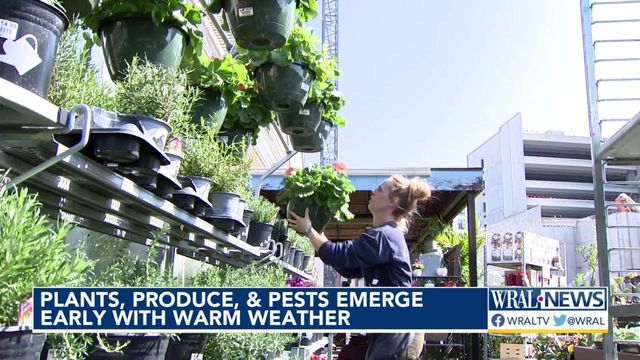Unseasonably warm weather can cause harm to plants, attract pests
Thursday brought the hottest high temperature Raleigh has ever had in February -- 85 degrees.
The unseasonable warmth isn’t normal. It can harm plants in your garden and bring out some pesky pests.
Thursday’s warm weather lured Hillary Davis Burgdorf to Logan's Garden Shop in Raleigh.
“We were talking today about what might survive a frost?” Burgdof said. “I know winter’s not done yet, so what types of plants might last?”
Burgdof loaded up on flowers, herbs and vegetable plants.
Logan’s Garden Shop owner Joshua Logan said home gardeners should avoid planting too much before we're out of the woods from a final freeze.
“There are lots of beautiful plants here in North Carolina that show color, that can be left out even in the cold,” Logan said.
Logan provided some advice to anyone interested in plants.
“You’re going to want to have it mobile,” Logan said. “Have it in a pot or container you can bring inside, or have it in a place where you can cover it with a light, breathable sheet to protect it from those frosty nights.”
Using 1991-2020 climate normals from the National Oceanic and Atmospheric Administration, Raleigh's last spring frost is set for April 3. NOAA's estimation uses a 30% probability.
According to data compiled from 1944-2019 by the North Carolina Climate Office, Raleigh's average last spring freeze date is April 8.

The heat is also an early spring awakening for bugs.
“They don’t have a calendar that says, ‘Hey it’s Feb. 23, hold the phone,’” said Amanda Wilkins, who is a horticulture agent with the NC State Cooperative Extension in Lee County.
“We have to start looking for butterflies and things flying around because it’s usually the insect larva that are our crop pests,” Wilkins said.
Wilkins said another pest could emerge if this warm weather is followed by some rain.
“They’ll lay their eggs in these puddles of water that accumulate in warm spots, and then they will hatch and here we go. We have mosquito weather super early,” Wilkins said.
The NC State Extension said the average last spring freeze here in the Triangle is in the first week of April.
However, because of the warm weather, the farmers said we could see crops like garden peas and strawberries earlier than usual.
Raleigh has had nine days with temperatures reaching at least 70 degrees this month. Typically, Raleigh gets two or three days of 70-degree temperatures in February.











